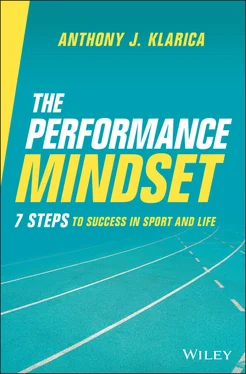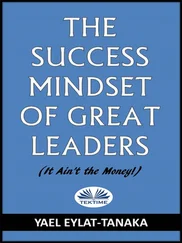Anthony J. Klarica - The Performance Mindset
Здесь есть возможность читать онлайн «Anthony J. Klarica - The Performance Mindset» — ознакомительный отрывок электронной книги совершенно бесплатно, а после прочтения отрывка купить полную версию. В некоторых случаях можно слушать аудио, скачать через торрент в формате fb2 и присутствует краткое содержание. Жанр: unrecognised, на английском языке. Описание произведения, (предисловие) а так же отзывы посетителей доступны на портале библиотеки ЛибКат.
- Название:The Performance Mindset
- Автор:
- Жанр:
- Год:неизвестен
- ISBN:нет данных
- Рейтинг книги:3 / 5. Голосов: 1
-
Избранное:Добавить в избранное
- Отзывы:
-
Ваша оценка:
- 60
- 1
- 2
- 3
- 4
- 5
The Performance Mindset: краткое содержание, описание и аннотация
Предлагаем к чтению аннотацию, описание, краткое содержание или предисловие (зависит от того, что написал сам автор книги «The Performance Mindset»). Если вы не нашли необходимую информацию о книге — напишите в комментариях, мы постараемся отыскать её.
The Performance Mindset: 7 steps to success in sport and life
The Performance Mindset: 7 steps to success in sport and life
The Performance Mindset — читать онлайн ознакомительный отрывок
Ниже представлен текст книги, разбитый по страницам. Система сохранения места последней прочитанной страницы, позволяет с удобством читать онлайн бесплатно книгу «The Performance Mindset», без необходимости каждый раз заново искать на чём Вы остановились. Поставьте закладку, и сможете в любой момент перейти на страницу, на которой закончили чтение.
Интервал:
Закладка:
Ideas around performance clearly extend beyond sport. I see a performance mindset as applicable to many fields beyond sport and as relevant for anyone interested in improving their performance. Athletes, coaches, parents, teachers or people working in or just interested in sport may enjoy and benefit from the pages ahead. I hope people in other fields interested in performance may also profit from what is presented. While the concepts examined through the book are interrelated, each step may be read as a stand‐alone topic.
One of the fascinating aspects of performance and human behaviour is how powerful the mind is. Also interesting is how individual a path to higher performance can be. This book sets out to inspire and upskill readers to develop their own performance mindset. Whether or not you agree with the ideas and philosophies put forward, I hope you gain some benefit and enjoyment from reading The Performance Mindset .
INTRODUCTIONMADE NOT BORN
Yes, you need a certain level of talent or innate skill, coordination and physical aptitude that are, at least in part, a product of your genetic code to become an athlete, but not as much as you might think. You also need to work relentlessly, investing hours, weeks, months and years, to realise any talent. But mindset is the key that unlocks talent, allowing you to remain engaged and committed to any practice to maximise this talent. Without a finely tuned mindset, the work doesn't happen. It also enables performance when it counts. Mindset is the cornerstone because it both contributes to doing the work and, once the work is done, helps to realise the talent and work. It's also important to understand that a performance mindset can be learned.
Laying a mindset foundation
Many environmental, social and personal factors contribute to mindset. It is about how a person thinks, feels and behaves in a wide range of situations, as well as how environmental and social situations are managed. Mindset also influences behaviour, sustaining motivation and focus, being resilient, decision making in and out of a sport, and managing personal wellbeing and relationships. A performance mindset is about having an attitude and toolkit of mental performance skills to help development and then perform at competitions. These skills are relevant not only in sport, but in spheres such as study, work and other activities. Here I want to explain why mindset is the foundation of performance. The chapters, or steps, that follow discuss how to build your performance mindset.
In most sports, a foundation of skill development, practice and conditioning is best laid in early years, which typically coincide with teenage life and early adulthood. Attitude and mental skills formed at this stage complement physical development and contribute to future performance. Mindset after an initial general technical and physical foundation is laid is vital, yet often overlooked. It helps to sustain motivation, deal with transition phases and capitalise on any initial work done. This is important because in sport, as in many fields in life, there are constant changes and new challenges. Being a high‐performing junior with elite talent is not a ticket to being a successful athlete in an open career. Don't be demoralised if you're not at the top of the ladder when you are 16, 18 or even 20. A commitment to building and sustaining a performance mindset is the biggest contributing factor for further development and performance.
Early success does not guarantee future success
Tennis is a global sport that draws an estimated 60 to 85 million players. There are about 160 000 coaches and almost half a million tennis courts around the world. A wide range of factors other than talent contribute to becoming a top 50 tennis player. For many weeks of the year, junior tournaments brim with young players hoping to forge a career in the big time. Four times a year, 32 of the best juniors qualify to play in the junior Grand Slam tournaments around the world: the Australian Open in Melbourne, the French Open at Roland Garros in Paris, Wimbledon in London or the US Open played at Flushing Meadows in New York.
Reviewing 10 years of junior Grand Slam finalists from 2001 to 2010 is fascinating. The top two from any of these tournaments are rated as among the top junior players in the world at that time. From this achievement and standing, one would expect that on average they would go on to become at least top 50 players in the world at any stage in their career in open tennis. But that's not the case.
Of all the junior male Grand Slam finalists from 2001 to 2010, the average career‐high ranking was 126 (not including two players who did not achieve a ranking inside 1000). Of all the junior female Grand Slam finalists from 2001 to 2010 the average career‐high ranking was 65. This data includes the players who did go on to become world number one. (In my review of the careers of 10 years of junior Grand Slam finalists I have not included 2011 onwards. This was to make data more valid by taking into account that players who played in a junior Grand Slam final after 2010 may have still not reached their peak ranking.) You would imagine that such data would sway the total pool to more players reaching at least a top 50 rank at some stage in their career. But it doesn't — so why not?
Keep in mind that a junior Grand Slam finalist is likely to attract greater support and encouragement from their national tennis federations or sponsors through funding, coaching or other means. This support would likely contribute to an increased opportunity to transition from a top junior to top 50 in an open career.
Naturally the answer to why more junior stars do not progress as high as one would expect is complex, and every sport has its own nuances. Some juniors win based on early physical maturity. In tennis this is negated somewhat by the relative importance of the skill component. Tennis players also travel for many weeks of the year to accumulate points and earn prize money as income. This is often with limited support or financial security, particularly for players outside the top 150 in the world. Injury and access to resources, including coaching, also impact possible progression. And as players transition from junior to open tennis, their competitors tend to be older, physically more developed and more experienced. This indicates that opponents in a one‐on‐one battle could have the advantage of 10 years' training, conditioning, maturity and mental skill development. Athletes in many sports transition from being top of the tree as a junior to a drop in results or selection when they join open ranks. Winning can be tough and they can face stretches with few victories, compared with their junior competition experience. Having been to junior Grand Slams around the world, I can vouch that some seriously good players are reaching finals. With some of the challenges mentioned, however, it is apparent that a performance mindset is necessary to convert a successful junior career to an open one.
It takes a particular mental fortitude to persist with the lifestyle of an athlete and, with the prospect of an insecure future, to chase their goal of becoming a top 50 or top 100 player in the world, let alone reaching the top 10 or number one. Mindset becomes a determining factor to capitalising on the initial foundation laid. Dealing with losing on the open tour, being patient when progress is slow, and sustaining motivation, commitment and work rate are all challenging. And they all involve mindset. I've found this a very common story — and not just in world‐class tennis.
The mindset to keep going
A challenge to developing a high‐performing open athlete is appreciating how individual the journey is. It is not a linear progression. Athletes, like everyone pursuing an endeavour, have different personal characteristics and backgrounds, and come from different geographical regions with varying support bases. Support, opportunities and even luck all play a role in the roller‐coaster path of sporting progression. Recognising and appreciating that each athlete's journey is unique and that there are many paths to achieving goals can aid persistence and development.
Читать дальшеИнтервал:
Закладка:
Похожие книги на «The Performance Mindset»
Представляем Вашему вниманию похожие книги на «The Performance Mindset» списком для выбора. Мы отобрали схожую по названию и смыслу литературу в надежде предоставить читателям больше вариантов отыскать новые, интересные, ещё непрочитанные произведения.
Обсуждение, отзывы о книге «The Performance Mindset» и просто собственные мнения читателей. Оставьте ваши комментарии, напишите, что Вы думаете о произведении, его смысле или главных героях. Укажите что конкретно понравилось, а что нет, и почему Вы так считаете.










